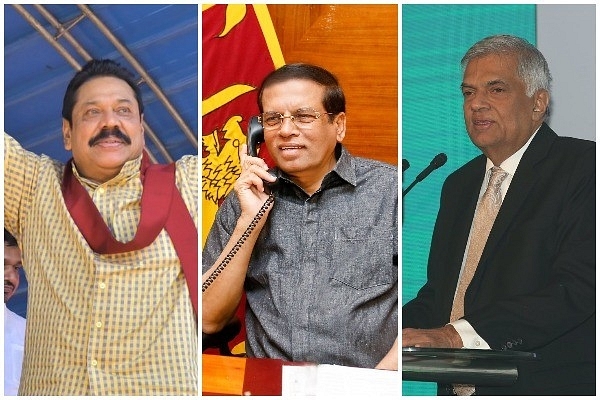World
A Tale Of Two Prime Ministers: The Constitutional Crisis In Sri Lanka Explained
- Unprecedented constitutional crisis In Sri Lanka as deposed Prime Minister Ranil Wickremesinghe refuses to relent under Sirisena’s onslaught.

Mahinda Rajapaksa, Maithripala Sirisena and Ranil Wickremesinghe
Sri Lanka has plunged into an unprecedented constitutional crisis with deposed Prime Minister and United National Party (UNP) leader Ranil Wickremesinghe digging in his heels and refusing to relent under the onslaught of President Maithripala Sirisena.
In a dramatic development on 26 October, Sirisena sacked his ally Wickremesinghe and appointed his bete noire and former president Mahinda Rajapaksa as the Prime Minister.
Vowing to continue on as Prime Minister despite being removed by Sirisena, Wickremesinghe asserted that the swearing-in of Rajpakse in his place is ‘illegal and unconstitutional’ and he will prove his majority in Parliament.
“I will continue to be the Prime Minister. Mahinda Rajapaksa’s appointment is unconstitutional,” Wickremesinghe said.
“Only I have the majority. The only way that can be changed is through a no-confidence motion or if I resign,” Wickremesinghe said, referring to the 19th amendment to the country’s Constitution.
“I defeated the no-confidence motion brought against me and enjoy a majority in Parliament. I remain Prime Minister for as long as I enjoy a majority in Parliament,” he added.
Wickremesinghe’s UNP also drew attention to the fact that the 19th amendment to the Constitution, enacted with the support of President Sirisena in April 2015, gives the President the power to appoint a new prime minister, but not the power to remove one.
As per Article 46 (2) of the 19th Amendment to the Constitution, the Prime Minister continues to hold office — throughout the period during which the Cabinet of Ministers continues to function under the provisions of the Constitution — unless he:
(a) resigns by writing or, (b) ceases to be a Member of Parliament.
All eyes are now on Speaker Karu Jayasuriya, who has to make a decision in this regard. Wickremesinghe has requested him to convene Parliament today (Sunday, 28 October). The Speaker is currently in consultation with the Attorney General and other constitutional experts, but is expected to make a statement on the issue later today.
The UNP is making its best attempt to rally its parliamentarians and demonstrate its majority. Rajapaksa and Sirisena together have a combined support of parliamentarians and is way short of a simple majority. The UNP continues to enjoy the support of 106 Parliament members which itself is seven short of the majority.
Most of the alliance partners who constitute the United National Front (UNF) including the UNP, the Sri Lanka Muslim Congress (SLMC), the Tamil Progressive Alliance (TPA) and the Jathika Hela Urumaya (JHU) have expressed support to Wickremesinghe. Tamil National Alliance (TNA) is yet to announce its decision.
However, two UNP MPs, Vasantha Senanayake and Ananda Alutgamage, have reportedly defected and already pledged support to Rajapaksa.
Rajapaksa, however, claims that his appointment is within constitutional norms and requested the UNP to abide by the law.
Colombo political circles are awash with speculation that Sirisena and Rajpakse have already struck a bargain which will enable Sirisena to contest the upcoming 2020 presidential elections against the UNP with the full support of Rajapaksa.
Wickremesinghe’s UNP and Sirisena, who led a breakaway faction of Sri Lanka Freedom Party (SLFP) formed a unity government in 2015, when Sirisena was elected president with Wickremesinghe’s support, ending nearly a decade-long rule by Rajapaksa. Sirisena, who served as Rajapaksa’s minister of health, broke away from him to contest the presidential elections.
The unity government saw frequent clashes between Sirisena and Wickremesinghe and the crisis was exacerbated by Rajapaksa’s party pulling off a stunning victory in local elections in February, seen as a referendum on the ruling alliance.
Last week, it was reported that Sirisena accused his senior coalition partner, the UNP, of not taking seriously an alleged conspiracy to assassinate him and Gotabhaya Rajapaksa, the former top Defence Ministry bureaucrat and brother of ex-president Mahinda Rajapaksa.
(With inputs from PTI)
Support Swarajya's 50 Ground Reports Project & Sponsor A Story
Every general election Swarajya does a 50 ground reports project.
Aimed only at serious readers and those who appreciate the nuances of political undercurrents, the project provides a sense of India's electoral landscape. As you know, these reports are produced after considerable investment of travel, time and effort on the ground.
This time too we've kicked off the project in style and have covered over 30 constituencies already. If you're someone who appreciates such work and have enjoyed our coverage please consider sponsoring a ground report for just Rs 2999 to Rs 19,999 - it goes a long way in helping us produce more quality reportage.
You can also back this project by becoming a subscriber for as little as Rs 999 - so do click on this links and choose a plan that suits you and back us.
Click below to contribute.
Latest